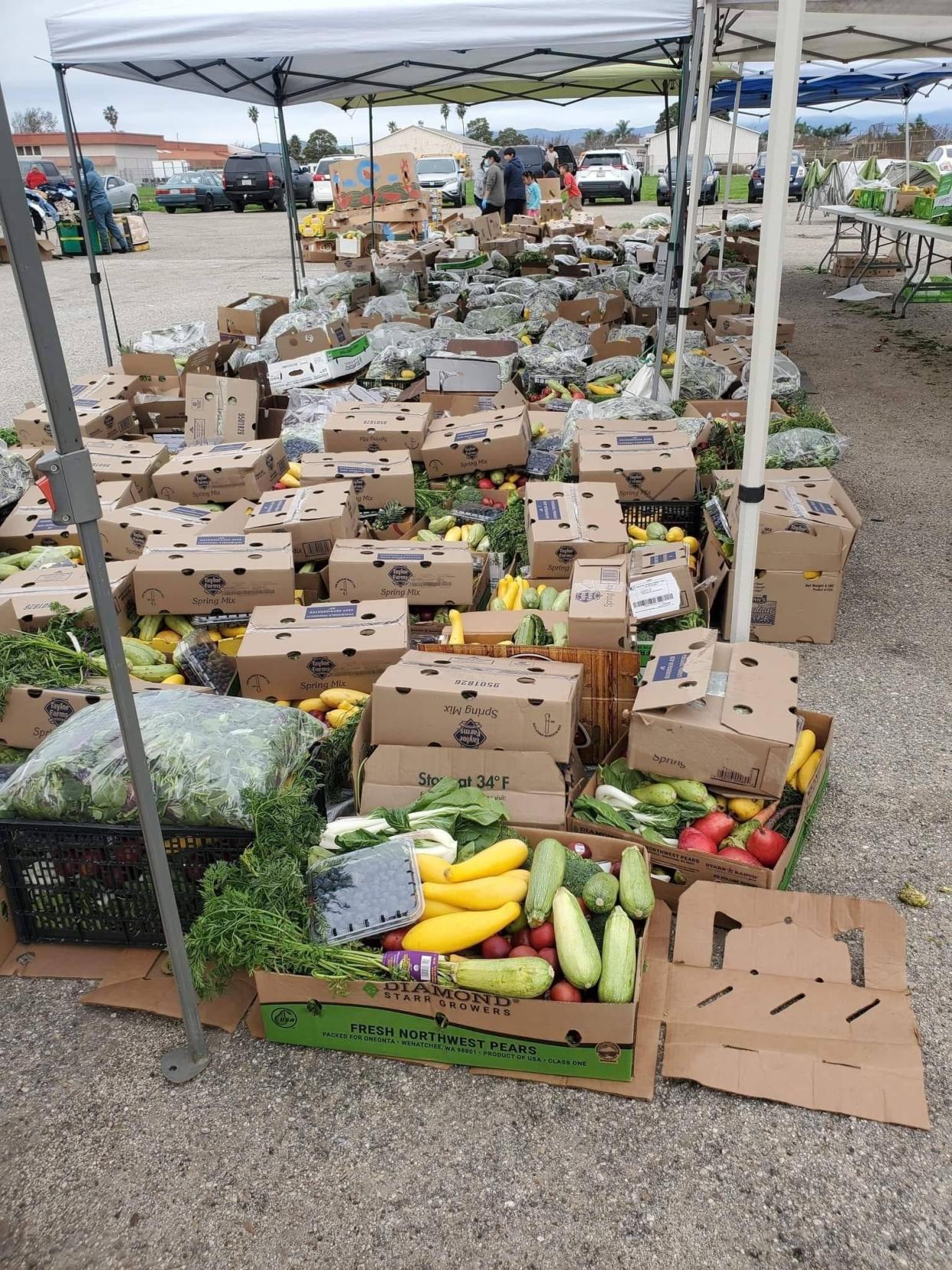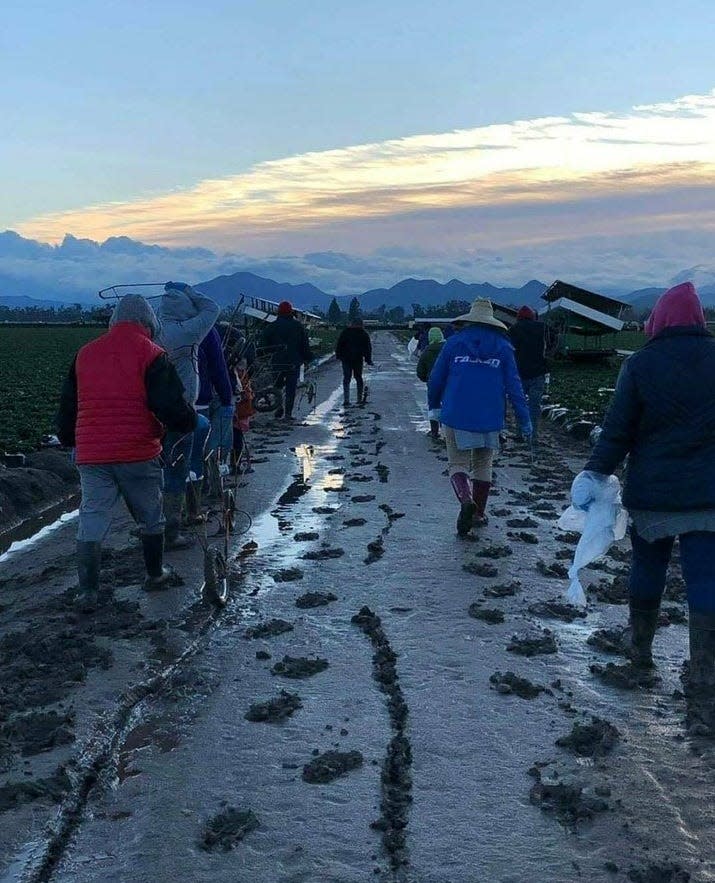Storms can mean lost wages for local farmworkers

This month’s storms flooded Ventura County’s agricultural fields, costing what farmers estimate may be millions of dollars of damage in the form of lost crops and livestock operations.
But the rains have also resulted in the loss of much-needed income for the region's farm laborers as lost crops have meant lost wages for families living near the poverty line.
Antonio De Loera-Brust, communications director for the labor union United Farm Workers, said the storms’ damage came at a particularly vulnerable moment for agricultural workers because work is already scarce during winter compared to the peak season in spring through fall when there is planting and harvest.
Food insecurity is a problem for farmworkers year round, he said, and UFW hosts weekend food pantries in communities where they organize to help families bridge the gap. De Loera-Brust said since the rains, the food pantries have seen more people than expected.
“Food insecurity for farmworkers is tragically ironic,” De Loera-Brust said.
Agriculture is a $2 billion industry in Ventura County, according to the county's 2021 crop and livestock report, and it relies on the labor of roughly 40,000 farmworkers who already struggle to survive on minimum wage in an area with high rents and low housing stock. Many workers earn the state minimum wage of $15.50 an hour but De Loera-Brust said undocumented workers sometimes make less.

Juvenal Solano, senior community organizer for the Mixteco Indigena Community Organizing Project, said the indigenous Mexican community speaks native pre-Hispanic languages, which means they struggle more than their Spanish-speaking counterparts to access resources. MICOP, which advocates for the indigenous migrants from Oaxaca, Guerrero, Michoacán and Puebla, assists over 8,000 workers each year, he said.
Solano said farm laborers often work in rainy conditions, but the volume of rain dumped by January's storms made it impossible to go into the fields.
“They want to work but the climate doesn’t let them,” he said.
Solano said many workers save up during the harvest season so they have enough money to get through the low season and the holidays, and they rely on picking up some work at the beginning of the strawberry season in January to make ends meet. The rains interrupted those plans, he said.
Solano said March, April and May are the best months for farmworkers because work is plentiful and laborers can get paid piece-rate for boxes of strawberries. The fastest workers can pick 100 boxes in one day, earning $200 per day before taxes. Typical workers, however, pick 70 to 80 boxes per day, he said.
For now, many workers are relying on foodbanks to feed their families. But housing is a primary concern for most families because rents are so high in Ventura County, Solano said.
“The financial need is very high right now,” Solano said. “It’s sad because they do a lot, and they get paid very low.”
He said if people want to help, they can donate to MICOP. De Loera-Brust said donors can also contribute to the UFW Foundation.
De Loera-Brust said farmworkers operate in a “patchwork economy.” He said some workers are employees of the farms, but are only given hours as needed. Many work for labor contractors, who put together crews and send them to farms as needed. Others are day laborers who seek out their own work.
Farm wages have risen slightly in recent years, and in 2022, a law guaranteeing farmworkers in California the right to overtime pay took full effect, De Loera-Brust said.
President Joe Biden declared a state of emergency for 17 counties in California, including Ventura, which will allow the state to access emergency aid. De Loera-Brust said while those funds may help farmers cover their losses, he's not sure enough aid will be available to make farmworkers whole, particularly those who are undocumented.
Around 45% of undocumented immigrants face food insecurity but are excluded from food assistance, according to MICOP.
“Storms can’t be helped but what you could help is, well, why are people living so close to the poverty line that one or two weeks of lost work is a huge issue?" De Loera-Brust said.

Not all farm work dried up in the rains. For individuals who still have work, picking the surviving crops and working to fix storm damage, they face using sharp tools in muddy, slippery and cold, finger-numbing conditions, he said.
UFW posted videos on social media of farmworkers in Ventura County dressed in plastic smocks rushing to harvest celery between storms and laboring under leaking hoop houses to pick berries.
Farmworkers laboring in treacherous conditions is nothing new, De Loera-Brust said. Farmworkers have harvested crops against the backdrop of wildfires and at the height of the pandemic.
On Jan. 14, UFW posted a video of a worker standing in a muddy strawberry field with the Ormond Beach power plant in the background.
“This is the American dream,” he said. “Look here. Our people are working hard.”
Dawn Megli is an investigative and watchdog reporter for the Ventura County Star. Reach her at dawn.megli@vcstar.com or @ReporterDawn. This story was made possible by a grant from the Ventura County Community Foundation’s Fund to Support Local Journalism.
This article originally appeared on Ventura County Star: Storms can mean lost wages for local farmworkers

